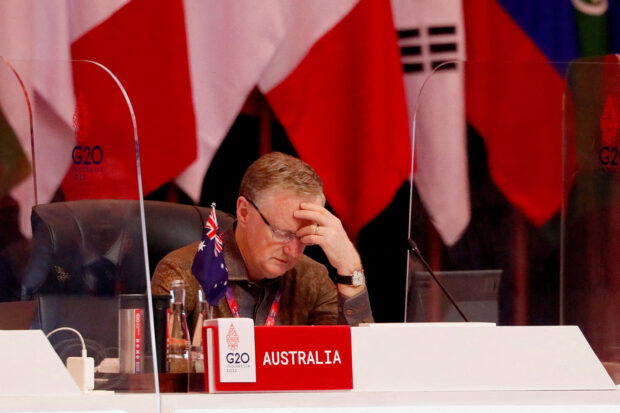Australia’s central bank loses chief to public ire over rates

Governor of the Reserve Bank of Australia (RBA) Philip Lowe attends the G20 Finance Ministers and Central Bank Governors Meeting in Nusa Dua, Bali, Indonesia, 16 July 2022. Made Nagi/Pool via REUTERS
SYDNEY – The head of Australia’s central bank suffered an early end to his 43-year career on Friday as past missteps in pandemic policy so tested public trust in the institution that the government felt compelled to drop him.
If there’s a moral to the tale of Reserve Bank of Australia (RBA) Governor Philip Lowe it’s that when it comes to policy stimulus, no matter how well meaning, it is possible to do too much.
Lowe’s dedication to the bank is not in doubt, having joined straight from school in 1980. Armed with a doctorate from MIT, he steadily climbed the ranks to deputy governor in 2012 and the top job four years later.
Whip-smart and soft spoken, Lowe was determined to use all the RBA’s powers to support the economy when the pandemic struck and Australia closed its borders, along with much of its economy.
A series of cuts took interest rates to an all-time low of 0.1 percent, while the bank pumped hundreds of billions of dollars into the economy through bond purchases and cheap loans to banks.
Article continues after this advertisementWhen combined with massive fiscal spending from the government, the stimulus proved wildly successful and Australia became the first developed nation to recover the economic output lost to the pandemic.
Article continues after this advertisementEven now, unemployment is near its lowest in 50 years at 3.6 percent and there are more Australians in work than ever before.
The use of so much unprecedented policy carried risks, however, and Lowe made two major missteps. The first mainly impacted markets while the second, and more fateful, soured sentiment with the public and politicians.
The first came in late 2021 when Lowe, faced with strains in the debt market, decided to abruptly end the bank’s purchases of short-term bonds, a major plank of its stimulus campaign.
The shock move savaged bond prices and badly wrong-footed investors, leaving many investors nursing painful losses. A later review found the event had caused the bank “reputational damage” and the policy was unlikely to be used again.
It also blotted Lowe’s copy book with a powerful investment community that otherwise might have been more voluble in his defense.
The more telling error was Lowe’s aggressive use of forward guidance, a common ploy for getting people to borrow and spend more by promising not to take the punchbowl way.
READ: Australia’s top central banker apologizes for past rate guidance
Lowe’s mistake in 2021 was to be too specific on timing by repeatedly saying rates were unlikely to rise until 2024.
That projection was heavily caveated on the bank’s economic forecasts being correct, but the distinction was lost in translation and the media regularly reported it as a “pledge”.
The policy began to rapidly unravel in early 2022 when domestic demand recovered far faster than anyone had expected and a wave of global inflation washed up on Australia’s shores.
With prices rising rapidly, Lowe was forced to reverse course and hike rates in May, a whole two years earlier than forecast.
READ: Australia central bank stuns market with 25-bps hike, says more might be needed
By then Australian households were loaded with record amounts of debt and did not take well to rising borrowing costs. Many blamed Lowe for misleading them and bombarded lawmakers with angry messages, calling for his head.
Much of the media soon joined in, with one tabloid sending paparazzi around to Lowe’s home to capture him taking out the trash.
Lowe resisted the pressure and defended his record by pointing to the strength of the labor market. Yet in a testy exchange with lawmakers, he still took the extraordinary step of apologizing to anyone who had trusted the bank and borrowed money as a result.
“I’m certainly sorry if people listened to what we’d said and then acted on that,” Lowe conceded, words few central bankers would care to utter.
But the clamor has only grown louder as the RBA kept tightening, hiking rates 12 times to a decade-high of 4.1 percent
Feeling the political heat, Treasurer Jim Chalmers launched an independent review of the central bank which recommended a radical shake up of its operations, including giving more voting power on policy to outside “experts”.
READ: Australia central bank to get new rate-setting board under review recommendations
Lowe’s position was increasingly in doubt as Chalmers came under intense pressure not to extend his seven-year term when it ends in September. Lowe’s two predecessors both got extensions, serving 10 years each.
While Chalmers professed great respect for Lowe, he was actively considering a number of possible replacements, including the current deputy governor Michele Bullock and several long-standing public servants.
In the end, Bullock was seen as the “ideal” candidate to lead a new era at the bank.
“This is a history-making appointment,” Chalmers told reporters. “Michele Bullock will become the first woman to ever lead the Reserve Bank in this country.”